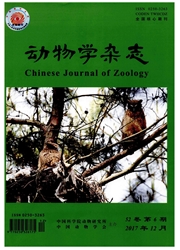

 中文摘要:
中文摘要:
在都江堰林区,通过在原生林、次生林和灌丛3类生境释放野生和栽培樱桃( Cerasus pseudocerasus )的种子,研究了啮齿动物对樱桃种子的捕食及其对樱桃种群更新的作用。结果表明,啮齿动物对樱桃两类种子的搬运无显著差异,而啮齿动物对野生樱桃种子的收获则明显快于栽培樱桃种子,且在3类生境均有类似的趋势。这说明啮齿动物偏爱于收获具有较高收益(种仁重/种子重)的野生樱桃种子。啮齿动物在小于10d的时间尺度收获了所有释放的樱桃种子,其中,70%以上为啮齿动物所搬运。春季食物的匮乏可能是导致啮齿动物对樱桃种子有较大捕食压力的主要原因,而生境类型间的差异较小。因此,啮齿动物是都江堰林区樱桃地表种子的主要捕食者,它们对野生樱桃种子的选择性捕食和搬运能影响樱桃种子/果实的进化及其种群更新。
 英文摘要:
英文摘要:
Seed predation and removal of wild and domestic cherry ( Cerasus pseudocerasus) by rodents were monitored in three habitats (primary stand, secondary stand and shrubland) in a subtropical evergreen broad-leaved forest in the Dujiangyan City of Sichuan Province, Southwest China. We investigated the differential selection by rodents on seeds produced by wild and domestic cherry and its impacts on natural regeneration of wild cherry. The results showed that: 1 ) there was no difference in seed predation and removal between wild and domestic cherry, but seed harvest was significantly faster for wild cherry than domestic cherry in all the three habitats, which showed that rodents prefer harvesting the seeds of wild cherry with higher seed benefit ( = kernel mass/seed mass) ; 2) all the seeds of both wild and domestic cherry were harvested by rodents within ten days, over 70% of seeds were removed. Poor seed availability in the spring (April-May) may be the main reason for high predation intensity of cherry seeds, while the differences among habitats had less effect on the predation of cherry seeds. Thus, rodents were main post-dispersal seed predators to cherry seeds in the Dujiangyan forest, and their differential predation and removal for the seeds may play important role in the evolution of cherry fruits and seeds (e. g. seed benefit) and population regeneration.
 同期刊论文项目
同期刊论文项目
 同项目期刊论文
同项目期刊论文
 Spatial and temporal variation of seed predation and removal of large-seeded species among stands an
Spatial and temporal variation of seed predation and removal of large-seeded species among stands an Acorn defenses to herbivory from insects: Implications for the joint evolution of resistance, tolera
Acorn defenses to herbivory from insects: Implications for the joint evolution of resistance, tolera Seed dispersal of Korean pine Pinus koraiensis labeled by two different tags in a northern temperate
Seed dispersal of Korean pine Pinus koraiensis labeled by two different tags in a northern temperate Seed consumption and caching on seeds of three sympatric tree species by four sympatric rodent speci
Seed consumption and caching on seeds of three sympatric tree species by four sympatric rodent speci Effects of mast seeding and rodent abundance on seed predation and dispersal by rodents in Prunus ar
Effects of mast seeding and rodent abundance on seed predation and dispersal by rodents in Prunus ar Difference of hoarding and consumption behavior among seed-caching rodents in Dujiangyan region, Chi
Difference of hoarding and consumption behavior among seed-caching rodents in Dujiangyan region, Chi Differences of dispersal fitness of large and small acorns of Liaodong oak (Quercus liaotungensis) b
Differences of dispersal fitness of large and small acorns of Liaodong oak (Quercus liaotungensis) b Seed predation and dispersal of glabrous filbert (Corylus Heterophylla ) and pilose filbert (Corylus
Seed predation and dispersal of glabrous filbert (Corylus Heterophylla ) and pilose filbert (Corylus 期刊信息
期刊信息
